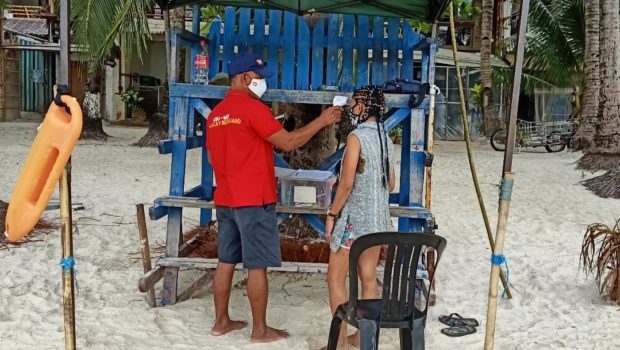
REQUIREDCHECK A lifeguard checks the body temperature of a visitor before she is allowed to enjoy Boracay’s white sand beach. —PHOTOCOURTESYOF PIAWESTERN VISAYAS
The Department of Tourism (DOT) is allotting P8 million to cover the cost of reverse transcription-polymerase chain reaction (RT-PCR) test for around 4,000 tourism workers in Boracay as part of efforts to revive the resort island’s tourism industry.
“By supporting RT-PCR testing among workers in Boracay, the [department] reiterates that safety is the unparalleled priority in reopening domestic tourism,” Tourism Secretary Bernadette Romulo-Puyat said in a statement on Monday.
“We want to restore confidence amongst travelers and protect their health and well-being as our tourism workers get their livelihood back,” Puyat said.
Battered
The DOT’s Tourism Promotions Board (TPB) will provide the funds through the Aklan provincial government.
The department and the TPB have also funded RT-PCR tests for tourism workers in other destinations, including Baguio City, which began accepting tourists again from the Ilocos region on Oct. 1.
Boracay’s tourism-based economy has been battered with months of closure to visitors due to COVID-19 travel restrictions and community quarantine measures.
Many business establishments have stopped operations or shut down, leaving thousands unemployed, or being asked to go on forced leave.
The 1,032-hectare island in Malay town reopened to tourists from Western Visayas on June 16 and from other areas on Oct. 1, but tourist arrivals have been minimal.
Domestic tourist arrivals had seen an uptrend but still remained low at only 658, as of Oct. 11 data from the municipal tourism office. Most of them came from Aklan province at 324, followed by residents of Metro Manila at 289 and others from the nearby provinces of Antique, Iloilo and Capiz.
Last year, a total of 932,423 domestic tourists visited Boracay.
Big help
Several business owners have blamed strict health requirements, including mandatory negative RT-PCR test results taken within 48 hours before arriving in Boracay for tourists.
RT-PCR tests, which cost at least P4,000 in Western Visayas, are also mandatory for returning employees of business establishments.
The DOT announcement of an P8-million allocation for the Boracay tests was welcomed by the local business operators.
“It is a big help and will lessen the burden on workers and employers as we expect more tourists to come,” Dionisio Salme, chair of the Boracay Foundation Inc., told the Inquirer in a telephone interview.
Testing priority will be the crew of motorboats and other front-line workers and employees of hotels, resorts and restaurants, Salme said.
While many commercial establishments on the island have remained closed due to lack of tourists, they expected tourist arrivals to increase in the coming months, he said.
Salme said they were hoping that the mandatory RT-PCR test for tourists would be waived in lieu of antigen tests as many had already canceled plans to visit Boracay due to difficulty in having tested within 48 hours before their trip.

